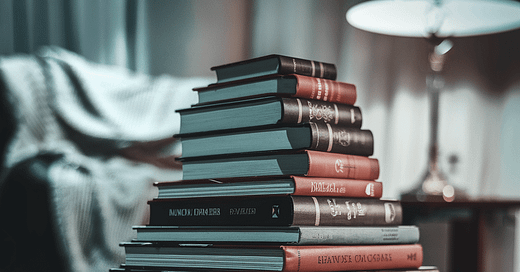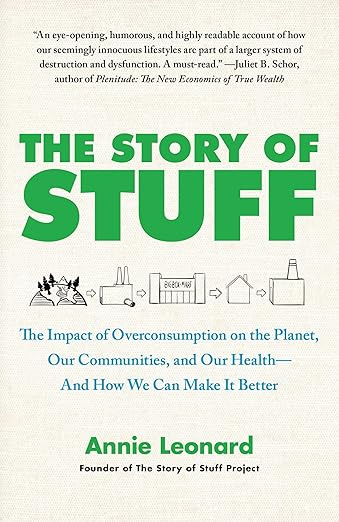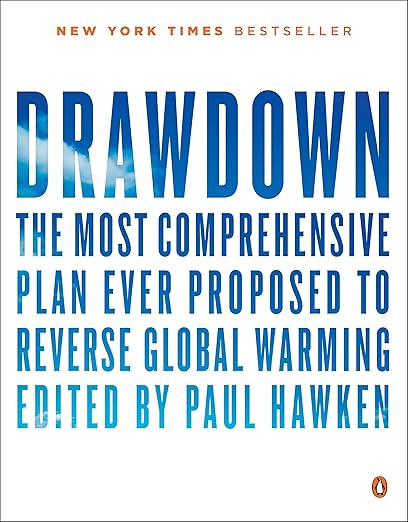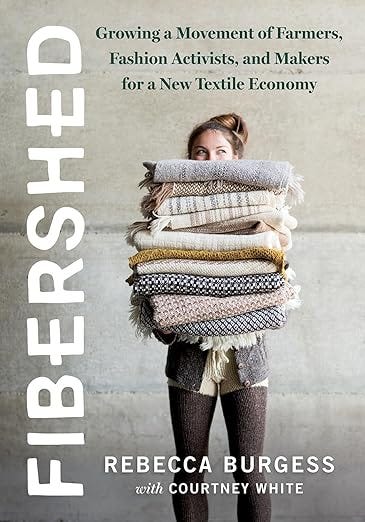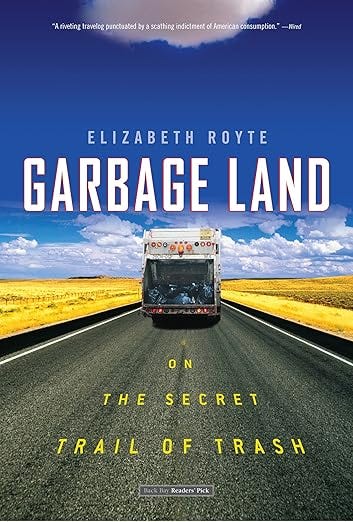We are a participant in the Amazon Services LLC Associates Program, an affiliate advertising program designed to provide a means for us to earn advertising fees by linking to Amazon.com and affiliated websites.
==============
The Story of Stuff: How Our Obsession with Stuff Is Trashing the Planet, Our Communities, and Our Health-and a Vision for Change
By Annie Leonard (@AnnieMLeonard)
*The Story of Stuff* pulls back the curtain on something we rarely stop to think about: all the stuff we buy, use, and toss without a second thought. It’s a deep dive into our consumption habits—how they affect the planet, other people, and, yeah, even ourselves.
Annie Leonard doesn’t just talk about it from a comfy chair, either. She’s been out there—on the ground, in factories, landfills, and communities most of us will never see firsthand. She’s met the people who live and work in the shadows of our stuff: kids mining minerals in the Congo, factory workers in Haiti, folks living next to toxic dumps. You can’t read this and not feel something.
This isn’t some dry academic read. It’s engaging, honest, and it got a lot of attention for good reason. Experts, educators, media—everyone was talking about it. And it’s not just doom and gloom, either. Leonard offers real, practical steps—for individuals and policymakers—to help shift things toward a fairer, healthier system.
*The Story of Stuff* has become a must-read for anyone who wants to understand how our choices are connected to the bigger picture. If you care about the planet, justice, or just want to stop feeling like a cog in the machine, this book is for you.
==============
Drawdown: The Most Comprehensive Plan Ever Proposed to Reverse Global Warming
by Paul Hawken (@PaulHawken) and Tom Steyer (TomSteyer)
Feeling overwhelmed by climate change? Yeah—me too, sometimes. It’s easy to look at the headlines and feel like the world’s on fire (because, in some places, it literally is). But here’s something that gave me hope.
A global team of scientists, researchers, and experts got together—not to scare us, but to show us what *can* be done. They pulled together 100 practical, powerful solutions. Some of them you’ve probably heard of—like solar energy or planting more trees. Others might surprise you—like educating girls or restoring farmland in ways that actually pull carbon *out* of the air.
And here’s the kicker: these solutions aren’t pie-in-the-sky ideas. They’re already happening. They’re working. They’re affordable. And if we scale them up—together, across communities and countries—we can actually start reversing climate change. Not just slowing it down. Reversing it.
And the ripple effects? Cleaner air. Better health. More jobs. Stronger communities. This isn’t just about avoiding the worst—it’s about building something better. A fairer, healthier, more sustainable world.
That’s something worth showing up for.
==============
The Intersectional Environmentalist: How to Dismantle Systems of Oppression to Protect People + Planet
by Leah Thomas (IG: GreenGirlLeah)
We talk a lot about saving the planet—cutting emissions, reducing plastic, planting trees—but how often do we stop to think about *who* we’re saving it for?
That’s the question at the heart of *The Intersectional Environmentalist* by Leah Thomas.
This isn’t just another environmental book. It’s a wake-up call—a reminder that climate change, pollution, and environmental destruction don’t hit everyone equally. If you’re Black, Indigenous, or a person of color, chances are you’ve felt the impact more deeply and more often than those with more privilege and protection.
Leah Thomas—who actually coined the term “Intersectional Environmentalism”—brings clarity, passion, and purpose to this conversation. She makes the case that fighting for our planet has to include fighting for justice. You can’t protect the environment without protecting the people most affected by its decline.
This book doesn’t just challenge the status quo—it offers a way forward. A path that lifts up marginalized voices, calls out uncomfortable truths, and reminds us that real change starts when we all have a seat at the table.
*The Intersectional Environmentalist* is for anyone who cares not just about the Earth, but about *everyone* who lives on it.
==============
Fibershed: Growing a Movement of Farmers, Fashion Activists, and Makers for a New Textile Economy
by Rebecca Burgess (LI: https://www.linkedin.com/in/rebecca-burgess-09b19511)
It’s kind of funny when you think about it.
We obsess over what goes into our bodies—organic, local, non-GMO, all the buzzwords. We read ingredient labels, avoid weird chemicals, and brag about farm-to-table meals. But when it comes to what we put *on* our bodies? Most of us don’t give it a second thought.
That shirt you love? The jeans you wear until they fall apart? Where did they come from? Who made them? What were they made with—and what’s that doing to the planet, or to us?
Rebecca Burgess asked those questions almost a decade ago—and decided to do something radical. She committed to wearing only clothes made from materials grown and produced near her home in Northern California. No loopholes. No fast fashion. Just local wool, cotton, flax, and the people who raise, grow, or weave it all.
What she found was more than just fabric. She found farmers, ranchers, and artisans who could help build an entire *ecosystem*—a local textile economy that supports the land and the people, instead of draining both. And it’s not just a feel-good idea—it’s a serious strategy for tackling climate change and healing the soil beneath our feet.
In *Fibershed*, Rebecca walks you through that journey—one that’s part science, part craft, and all heart. Whether you’re a farmer, a weaver, or someone who just wants to do better with the clothes you wear, this book might just change the way you get dressed in the morning.
==============
Garbage Land: On the Secret Trail of Trash
By Elizabeth Royte (@ElizabethRoyte)
“Out of sight, out of mind,” right?
We toss things without thinking twice—dead batteries, leftover spaghetti, broken toys, ratty old t-shirts, diapers, ancient cassette tapes that haven’t seen a Walkman since 1989. We bag it up, drop it in the bin, and drag it to the curb like it disappears the moment the truck drives off.
But have you ever really thought about where all that stuff goes? I hadn’t. Not really.
Elizabeth Royte did.
Her book, *Garbage Land*, takes you on an eye-opening, sometimes stomach-turning tour through the life of your trash—from the moment it hits the bottom of the bin to the places you probably don’t want to imagine. You meet people who live next to landfills, scientists who study the chemistry of stink, and folks who are obsessed with composting or kayaking through sewage (yes, really). She talks to the recycling die-hards, the industrial power players, and even people who believe we should be reusing human waste. And somehow, she manages to keep a sense of humor through it all.
*Garbage Land* isn’t just about trash—it’s about us. Our habits. Our choices. Our impact. It reminds us that everything we throw away doesn’t just disappear. It lingers—in our air, our water, and eventually, in our food.
If you think the story ends at the curb, think again.
==============
Plenty there to read and think about. I encourage you to try these books and others that are similar.
Until next time,
Casey


